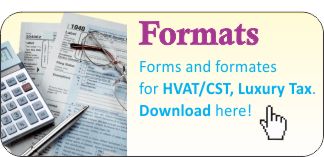E way Bill
Dear Sir/Madam
Greetings for the day!
E-Way Bill is an electronic way bill for movement of goods which can be generated on the e-Way Bill Portal which will be effective wef 01/02/2018. Transport of goods of more than Rs 50,000 in value cannot be made by a registered person without an e-way bill.
E-way bill can also be generated or cancelled through SMS.
When an e-way bill is generated a unique e-way bill number (EBN) is allocated and is available to the supplier, recipient, and the transporter.
2. When Should e-Way Bill be issued?
E-way bill will be generated when there is a movement of goods of value more than Rs. 50,000 –
In relation to a ‘supply’
For reasons other than a ‘supply’ ( say a return)
Due to inward ‘supply’ from an unregistered person
For this purpose, a supply may be either of the following:
A supply made for a consideration (payment) in the course of business
A supply made for a consideration (payment) which may not be in the course of business
A supply without consideration (without payment)In simpler terms, the term ‘supply’ usually means a:
Sale – sale of goods and payment made
Transfer – branch transfers for instance
Barter/Exchange – where the payment is by goods instead of in money
Therefore, e-Way Bills must be generated on the common portal for all these types of movements.
3. Cases when e-Way bill is Not Required
In the following cases it is not necessary to generate e-Way Bil:
The mode of transport is non-motor vehicle
Goods transported from port, airport, air cargo complex or land customs station to Inland Container Depot (ICD) or Container Freight Station (CFS) for clearance by Customs.
Transport of specified goods (PDF of List of Goods).
Note: Part B of e-Way Bill is not required to be filled where the distance between the consigner or consignee and the transporter is less than 10 Kms and transport is within the same state.
4. Who should Generate an e-Way Bill?
Registered Person – E-way bill must be generated when there is a movement of goods of more than Rs 50,000 in value to or from a Registered Person. A Registered person or the transporter may choose to generate and carry e-way bill even if the value of goods is less than Rs 50,000.
Unregistered Persons – Unregistered persons are also required to generate e-Way Bill. However, where a supply is made by an unregistered person to a registered person, the receiver will have to ensure all the compliances are met as if they were the supplier.
Transporter – Transporters carrying goods by road, air, rail, etc. also need to generate e-Way Bill if the supplier has not generated an e-Way Bill.
Who When Part Form
Every Registered person under GST Before movement of goods Fill Part A Form GST EWB-01
Registered person is consignor or consignee (mode of transport may be owned or hired) OR is recipient of goods Before movement of goods Fill Part B Form GST EWB-01
Registered person is consignor or consignee and goods are handed over to transporter of goods Before movement of goods Fill Part B The registered person shall furnish the information relating to the transporter in Part B of FORM GST EWB-01
Transporter of goods Before movement of goods Generate e-way bill on basis of information shared by the registered person in Part A of FORM GST EWB-01
An unregistered person under GST and recipient is registered Compliance to be done by Recipient as if he is the Supplier. 1. If the goods are transported for a distance of ten kilometers or less, within the same State/Union territory from the place of business of the consignor to the place of business of the transporter for further transportation, the supplier or the transporter may not furnish the details of conveyance in Part B of FORM GST EWB-01.
2. If supply is made by air, ship or railways, then the information in Part A of FORM GST EWB-01 has to be filled in by the consignor or the recipient
Note: If a transporter is transporting multiple consignments in a single conveyance, they can use the form GST EWB-02 to produce a consolidated e-way bill, by providing the e-way bill numbers of each consignment.
If both the consignor and the consignee have not created an e-way bill, then the transporter can do so by filling out PART A of FORM GST EWB-01 on the basis of the invoice/bill of supply/delivery challan given to them.
5. States that have Notified e-Way Bill
The following states have notified e-Way bill for inter-state transport:
Karnataka
Uttarakhand
Rajasthan
Kerala
Jharkhand
Sikkim
Goa
Telangana
Himachal Pradesh
Puducherry
6. Process to generate e-Way Bill
E-Way Bill can be generated on the e-Way Bill Portal. All you need is a Portal login. For a detailed step-by-step guide on e-Way Bill Generation check out our article – Guide to generate e-Way Bill online.
7. Validity of e-Way Bill
An e-way bill is valid for periods as listed below, which is based on the distance travelled by the goods. Validity is calculated from the date and time of generation of e-way bill-
Distance Validity of EWB
Less Than 100 Kms 1 Day
For every additional 100 Kms or part thereof additional 1 Day
8. Documents or Details required to generate e-Way Bill
Invoice/ Bill of Supply/ Challan related to the consignment of goods.
Transport by road – Transporter ID or Vehicle number.
Transport by rail, air, or ship – Transporter ID, Transport document number, and date on the document.
In case you need any other information/ clarification from our end, please feel free to contact.
Complete rules are attached for your refrence.
Best Regards
RK Jain & Associates
Advocates,Taxation Consultants
984 Sector-15 Part-II,Gurgaon(HR)122001
Tel:- 0124-4235697,09599506890
Gaurav Jain 9818606890
Rajkumar Jain 9810327932
Nitika Jain 9599225708
E-Mail :- jainrk_adv@rediffmail.com
E-Mail :- info@rkjainassociates.com
Web:- www.rkjainassociates.com
| Attachment | Size |
|---|---|
| EWAYBILL.PDF | 3.32 MB |




